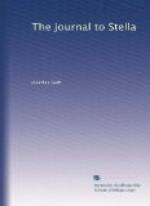Sir Henry Craik is satisfied with the evidence for the marriage. Mr. Leslie Stephen is of opinion that it is inconclusive, and Forster could find no evidence that is at all reasonably sufficient; while Mr. Stanley Lane-Poole, Mr. Churton Collins, and others are strongly of opinion that no such marriage ever took place. A full discussion of the evidence would involve the consideration of the reliability of the witnesses, and the probability of their having authentic information, and would be out of place here. My own opinion is that the evidence for the marriage is very far from convincing, and this view seems to be confirmed by all that we know from his own letters of Swift’s relations with Stella. It has been suggested that she was pained by reports of Swift’s intercourse with Vanessa, and felt that his feelings towards herself were growing colder; but this is surmise, and no satisfactory explanation has been given to account for a form of marriage being gone through after so many years of the closest friendship. There is no reason to suppose that there was at the time any gossip in circulation about Stella, and if her reputation was in question, a marriage of which the secret was carefully kept would obviously be of no benefit to her. Moreover, we are told that there was no change in their mode of life; if they were married, what reason could there be for keeping it a secret, or for denying themselves the closer relationship of marriage? The only possible benefit to Stella was that Swift would be prevented marrying anyone else. It is impossible, of course, to disprove a marriage which we are told was secretly performed, without banns or licence or witnesses; but we may reasonably require strong evidence for so startling a step. If we reject the tale, the story of Swift’s connection with Stella is at least intelligible; while the acceptance of this marriage introduces many puzzling circumstances, and makes it necessary to believe that during the remainder of Stella’s life Swift repeatedly spoke of his wife as a friend, and of himself as one who had never married.[7] What right have we to put aside Swift’s plain and repeated statements? Moreover, his attitude towards Vanessa for the remaining years of her life becomes much more culpable if we are to believe that he had given Stella the claim of a wife upon him.[8]
From 1719 onwards we have a series of poems to Stella, written chiefly in celebration of her birthday. She was now thirty-eight (Swift says, “Thirty-four—we shan’t dispute a year or more"), and the verses abound in laughing allusions to her advancing years and wasting form. Hers was “an angel’s face a little cracked,” but all men would crowd to her door when she was fourscore. His verses to her had always been
“Without one word
of Cupid’s darts,
Of killing eyes,
or bleeding hearts;
With friendship
and esteem possessed,
I ne’er
admitted Love a guest.”




